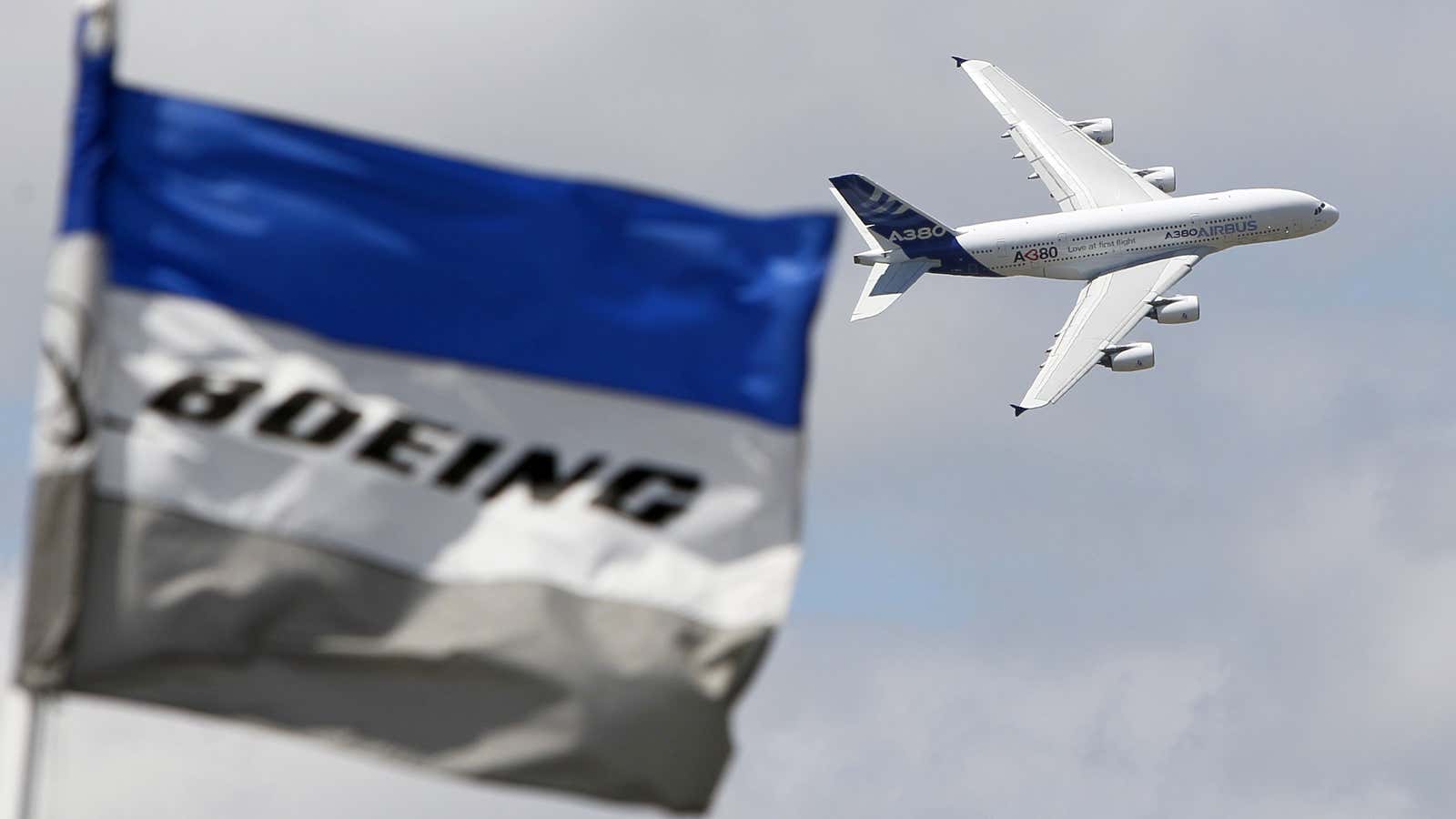With its Dreamliner planes grounded across the globe, Boeing’s fight for bragging rights as the world’s biggest passenger aircraft manufacturer is at risk. The title of top supplier by order volume—which Boeing just clinched from Airbus for the first time in a decade for 2012—is something both companies mercilessly compete over. Depending upon the severity of the problems investigators uncover, they could be enough to cost Boeing that title going forward.
Last year, Boeing received 1,203 net orders for aircraft, stepping ahead of Airbus’s 833. Both manufacturers have struggled to respond to a surge in demand for more fuel-efficient planes, and have wracked up an eight-year backlog of plane orders. Because these orders extend far into the future, airlines who have ordered these planes have the power to cancel their orders for any number of reasons—right up until the plane arrives. The production setback isn’t helping Boeing “while the other [Airbus] production lines are going full throttle,” says Richard Aboulafia, vice president of analysis at the Teal Group and an expert in the aircraft and defense market. “Watch this space.”
Right now, investigations into the Dreamliner 787’s problems are in their infancy. At this point, technical difficulties appear to stem from the plane’s lithium-ion batteries that help propagate the plane’s electrical system. The electrical system—versus old hydraulic systems—allows the aircraft to use 20% less fuel than rival planes, according to Boeing estimates.
In a note yesterday Deutsche Bank aviation analyst Myles Walton wrote, “The 787 Li-Ion battery weighs 63 pounds and there is a main battery and an APU battery. So maybe weight sacrifice of 126lbs. It’s not as trivial as a clean swap as space, integration, etc., so we don’t want to imply it’s a simple swap, but it seems definitely doable, in our view.”
Walton and other financial analysts remain cautious about forecasting any revenue or profit impact from the Dreamliner problems at this stage. Boeing shares have avoided a major sell-off, even rallying 1.24% today on reports that investigators are looking into a battery problem.
If it’s just an issue of the battery, and the battery can indeed be replaced easily, then this isn’t such a big deal for Boeing beyond the short-term. “Odds are very good that this will be ironed out” before airlines start canceling orders for Dreamliner 787s, Aboulafia believes. ”There are glitches and teething pains and then there are serious design flaws. This is still in the bucket of glitches and teething pains, but it’s a big bucket.”
Even this might cost Boeing a fistful of cash. Aboulafia explains, “There’s a clause in the contracts [airline companies sign with manufacturers] in which they can delay delivery [until all the problems are sorted out]. Boeing will offer them incentives to accept delivery, and then it comes down to price.” Any deliveries won’t be made without due diligence; airline companies will have research teams working alongside Boeing to figure out how big the Dreamliner’s problems really are. “They’re not going to be flying blind here,” Aboulafia said.
Boeing did not respond to requests for comment about how the Dreamliner issues might affect its sales.
So far, airline companies have remained mum on the subject. United Airlines already has six Dreamliner 787s (now grounded) of the 50 it has ordered. The US carrier says it “is working closely” with both Boeing and the US Federal Aviation Administration, but wouldn’t go into detail on the subject when queried via email.
The airlines’ research teams will be on the ground deciding whether the Dreamliner’s problems are enough to warrant canceling plane orders or shifting future purchases to other manufacturers. A couple of weeks or months delay wouldn’t cause most airline companies to cancel their plans for the Dreamliner. Most order 50 or more planes, and there wouldn’t be too much of an issue if there are growing pains in the first batch. Any bigger problems and delays, however, will definitely handicap Boeing in its battle to stay on top of the heap.




